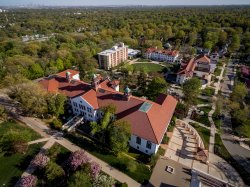Table of Contents
Our Mandate
Montclair State University is committed to the full inclusion of students with disabilities in all curricular and co-curricular activities as mandated by Section 504 of the Rehabilitation Act of 1973. The Disability Resource Center (DRC) will assist students in receiving the accommodations and services necessary to equalize access. The DRC provides assistance to students with physical, sensory, learning, psychological, neurological, and chronic medical disabilities. The mission of the DRC is to unite the Montclair State University community in an effort to provide students with disabilities the excellence and equity in education to which they are legally entitled.
Accommodations
The DRC provides accommodations to assist students in their academic and student life-related activities. Mandated by law, accommodations are determined on a case-by-case basis and require supporting documentation and an appointment with one of the DRC professional staff. Below is a sample of potential accommodations available; exact accommodations may differ by student:
- Additional time on exams
- Note-taking assistance
- Digital or Audio Books
- Captioning/ASL Interpreting
- Early Registration
- Assistive Listening Devices
- Digital recorders
- Screen Readers/ Screen Magnification
- Dictation Software
- Text-to-Speech Software
- Graphic Organizing Software
Requests for housing accommodations also require the Housing Accommodations Request form located in the Forms section of the DRC website. The accommodations listed below are some examples of potential housing accommodations processed by the DRC. Requests are approved according to supporting documentation and assigned, as available and appropriate.
- Single room housing
- Additional furniture (refrigerator, specific adaptive furniture)
- Room modifications/assignments (1st floor, accessible bathroom, air conditioning)
- Emotional Support Animal
- Single room housing
- Additional furniture (e.g., refrigerator, specific adaptive furniture)
- Room modifications/assignments (e.g., 1st floor, accessible bathroom, air conditioning)
- Emotional Support Animal
Requests for dining accommodations also require the Dining Accommodations Request form located in the Forms section of the DRC website. Requests are approved according to supporting documentation and arranged through collaborations with Dining Services and Residence Life, as appropriate.
Students with 29 credits or less who are requesting to park on-campus must also provide the Parking Policy Exemption Request form located in the Forms section of the DRC website. Students approved to park on campus but in need of closer parking must provide supporting documentation from their medical or mental health provider. The criteria for accepted documentation is located in the Documentation Guidelines section of the DRC website. Approved requests will be provided by Parking Services. Please allow 2-3 business days after your request has been approved for the update to reflect in your parking options.
Requests for accommodations due to pregnancy require supporting documentation from your medical provider. The criteria for accepted documentation is located in the Documentation Guidelines section of the DRC website.
Additional Resources & Support
In addition to accommodations, the DRC also provides a variety of resources for additional support in and out of the classroom. Please speak with your DRC Counselor or visit the Student Resources webpage for additional resources.
The DRC hires graduate student interns as Academic Coaches(AC). The AC provides individual and group sessions to assist students develop academic, professional, and self-advocacy necessary for success in college and beyond. Some topics of interest include: time management/organizational skills, note-taking, business/professional communication, and avoiding procrastination. Please speak with your DRC Counselor for more information or to begin working with the AC.
Working with the DRC regarding registration or academic advising does not replace the role of your assigned Academic/Program Advisor. However, the DRC can assist students develop their course schedules, identify courses that satisfy a DRC approved course substitution, or organize their schedule in a way that recognizes specific DRC-related concerns. Please speak with your DRC Counselor prior to the beginning of registration for more information.
Working with the DRC regarding career or internship advising does not replace the role of the Career Services Advisor. The DRC can assist students prepare for interviews, obtain an Internship or job placement in a location sensitive to their specific challenges or needs, or discuss employment-related accommodations. Please speak with your DRC Counselor for more information.
The DRC provides referrals to the Psychoeducational Services Clinic (PSC) for students who require updated documentation or wish to be evaluated for a possible learning-related diagnosis (i.e., ADHD, learning disabilities, etc.). A separate application and referral from the DRC is required. PSC also issues a separate fee for testing services; however, the fee is reduced when compared to external evaluation services. Please speak with your DRC Counselor for more information.
Rights and Responsibilities
The university has the following rights and responsibilities:
Rights:
- To identify and establish essential functions, abilities, skills, and knowledge for employment, courses, programs, services, and activities and to evaluate faculty, staff, and students on this basis.
- To request and receive current documentation that supports requests for reasonable accommodations, academic adjustments, and/or auxiliary services.
- To deny a request for accommodations, academic adjustments, and/or auxiliary services if the documentation demonstrates that they are not warranted, or if the individual fails to provide appropriate documentation.
- To select among equally effective reasonable accommodations, adjustments, and/or auxiliary services.
- To refuse an unreasonable accommodation, adjustment, and/or auxiliary service or one that imposes and undue hardship or fundamental alternation on a program or activity of the university.
Responsibilities:
- To provide information to faculty, staff, students, and guests with disabilities in accessible formats upon request.
- To ensure that employment, courses, programs, services, and activities when viewed in their entirety are available and usable in the most integrated and appropriate settings.
- To evaluate faculty, staff, students, and applicants on their abilities and not on their disabilities.
- To provide or arrange reasonable accommodations, academic adjustments, and/or auxiliary services for faculty, staff, students, and guests with disabilities in employment, courses, programs, services, facilities, and activities.
- To maintain appropriate confidentiality of records and communication, except where permitted/required by law.
